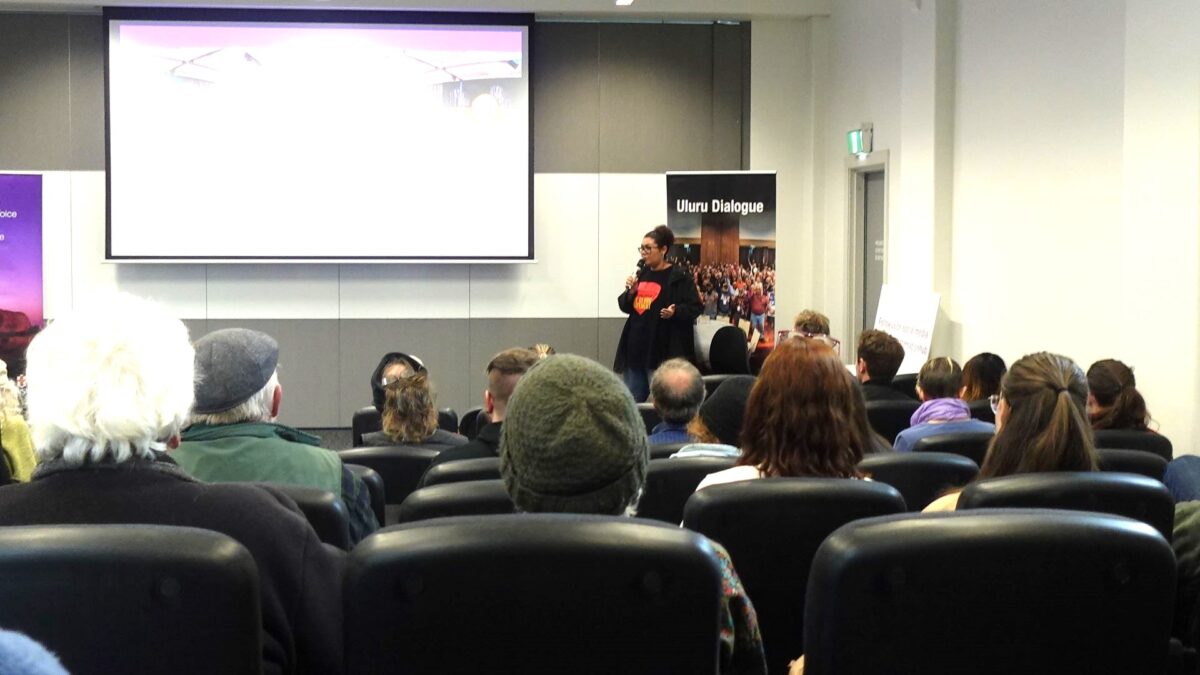Locals not afraid to ask tough questions at Voice Information sessions


Uluru Youth Dialogue Co-Chair Bridget Cama addresses local community members at the Maldhan Ngurr Nurra Lithgow Transformation Hub over the weekend.
Communities across NSW and Queensland have been asking the big, tough questions at special information sessions being held about the upcoming Voice to Parliament referendum.
The Uluru Dialogue team in recent weeks has been touring the two Aussie states and hosting these information sessions to provide First Nations people and local communities with a chance to gain a better understanding of what the proposed Voice to Parliament is all about and why it is so important.
“These information sessions are crucial to ensuring regional communities get the information they need to make an informed decision on the Voice referendum,” said Uluru Youth Dialogue Co-Chair Bridget Cama following a successful pair of information sessions (one for the local First Nations community and then another for the broader public) held at Lithgow, NSW over the weekend.

Over 60 people turned up to the Lithgow information session, with facilitators having to shift the event to a larger room at the Maldhan Ngurr Nurra Lithgow Transformation Hub.
“For some people attending these sessions, this is the first time they are having access to factual information about where the Voice comes from and what it is.”
Ms Cama said a common query raised at Lithgow, especially from attendees at the wider community forum, concerned whether First Nations people actually wanted the voice themselves. She said she was glad to point towards recent polling which suggests an approval rating for the Voice concept of 83 per cent among Indigenous and Torres Strait Islander people, as per Yougov polling - consistent with a vote taken at the Uluru national convention in 2017.
Ms Cama, who facilitated the Lithgow event, held at Maldhan Ngurr Nurra Lithgow Transformation Hub, with fellow Uluru Youth delegate Brydie Zorz, said people also wanted to know why “yes” and “no” pamphlets, which will be distributed to all Australians, will not be fact checked ahead of them being sent out.
She said people also wanted to know why it’s so important for the Voice to be constitutionally enshrined. There was also concern surrounding misinformation.
As well, Ms Cama said people really wanted to know what actions they could be taking to support and spread the word about the Voice in their community – and even activate and hold their own information sessions.
Ms Cama said many Lithgow locals remarked they weren’t sure which way they were planning on voting coming into the session, but left feeling a lot more confident in voting “yes”.
She said they shared insights that the session had opened their mind to reconsidering their previous position and that they felt they were much better equipped to go and have conversations with their friends, family and networks.
“We wanted to run these community information sessions about the Voice to parliament and upcoming referendum in Lithgow, our hometown, to better inform the local community,” she said.
“There was a fantastic turnout at Lithgow. Over 60 people attended from Lithgow and surrounding areas including Capertee, Wallerawang, Portland and Katoomba,” Ms Cama said.
The Uluru Dialogue team also ventured to Moree at the weekend to talk with local First Nations people and the wider community, with another strong turnout of participants who were eager to learn more about the proposed Voice.

Director of The Uluru Dialogue Geoff Scott met with First Nations people and the wider community at Moree over the weekend.
“It was a very robust discussion; Moree has many issues which it has dealt with over many years, such as deaths in custody,” Moree session facilitator and The Uluru Dialogue Director Geoff Scott said.
“It’s a town trying to acknowledge its devastating past and move on.
“There is still a distrust of government across the board at these discussions. People are also asking about what will happen after the referendum.
“A lot of the session is spent combating the misinformation being spread by the “no” campaigners. We provide a safe space for a proper conversation. This is what people need.
“The interest is really generating. People are asking the deep questions.
“Everyone out here is merely focussed on surviving; Covid-19 frightened the bush, there are child protection concerns … they’re saying it’s all moving the wrong way and that we can’t keep going the way we are.
“The Voice will provide that opportunity for change.
“We can all see that the public servants are incapable of providing open, frank and fearless advice. It’s always been a major problem for us. And that’s why we’re doing this.”
To date, The Uluru Dialogue team has held information sessions across Queensland including at Cooktown, Laura, Cairns, Mossman, Ingham, Innisfail and Mareeba.
They have also been spreading the word across several NSW regions and towns including Lightning Ridge, Walgett and Narrabri as well as across Sydney.
Australians are expected to vote in the Constitutional Referendum on the proposed Voice to Parliament sometime between October and December this year.
